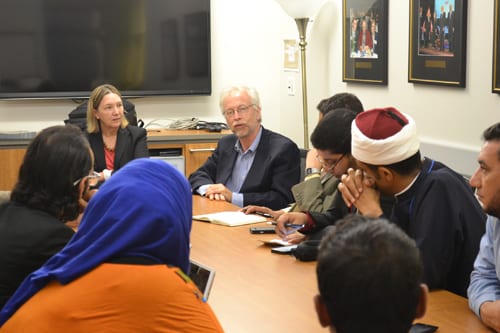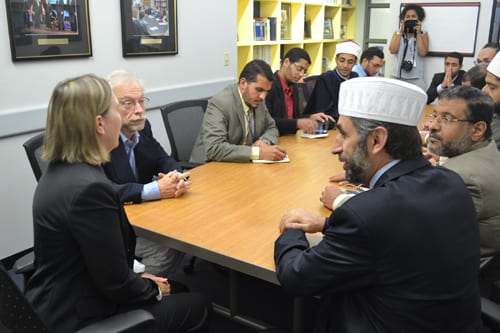
As the new Public Diplomacy Diplomatic Fellow at GWU, I still stand with a foot slowly lifting off from my last “post” – U.S. Embassy Cairo and the other foot planted in an office at the IPDGC.
On September 9, both worlds merged as IPDGC hosted a delegation of Islamic religious scholars from Al-Azhar University in Cairo, the major center of Sunni learning in the Middle East, as well as imams and representatives from the Dar al Iftah and the office of the “Grand Imam” at al-Azhar. The visit was organized by the Civilizations Exchange and Cooperation Foundation (CECF) and its director, Imam Bashar Arafat; and funded via a public diplomacy grant from the Public Affairs Office in Embassy Cairo.
The program, a three-week visit to the U.S., took the scholars all over the United States to meet with representatives of religious, academic, government and NGO institutions. This people-to-people dialogue was aimed at increasing awareness among the delegates and the people they met regarding points of mutual interest, concern and potential cooperation.
Professor Nathan Brown from the Elliott School Middle East Studies program joined me in a discussion with the delegation. Previously, Dr. Brown had met some of the delegates during a speaking program in Cairo, organized by the Public Affairs Office, on comparative constitutions. Members of the delegation were glad to see a familiar face. They were curious about the School of Media and Public Affairs and how media could be used to improve understanding rather than increase stereotypes.

They stated their dedication to increasing mutual understanding and their appreciation for the members of the Jewish, Christian and Muslim communities who met with them during their visit. Members conveyed their concern for the threat from terrorist groups, whom they noted had nothing to do with the real “Islam”. Their final request was for greater contact and cooperation between George Washington University and Al-Azhar University in Egypt.
Opening doors to dialogue is an important function of public diplomacy. Listening to the point of view of others and finding common interests is step one in the process of explaining American society and values. A common foundation of knowledge and understanding is useful when public diplomacy professionals at the Department of State are trying to explain and convey U.S. policy objectives. On September 9, GWU and the IPDGC played an important role by offering a warm welcome to the delegation and listening to their concerns, goals and hopes for the future.
The views expressed in this blog are those of the author and do not necessarily reflect those of the State Department or the U.S. government. The author is a State Department officer specializing in public diplomacy, currently detailed to the IPDGC to teach and work on various Institute projects.

